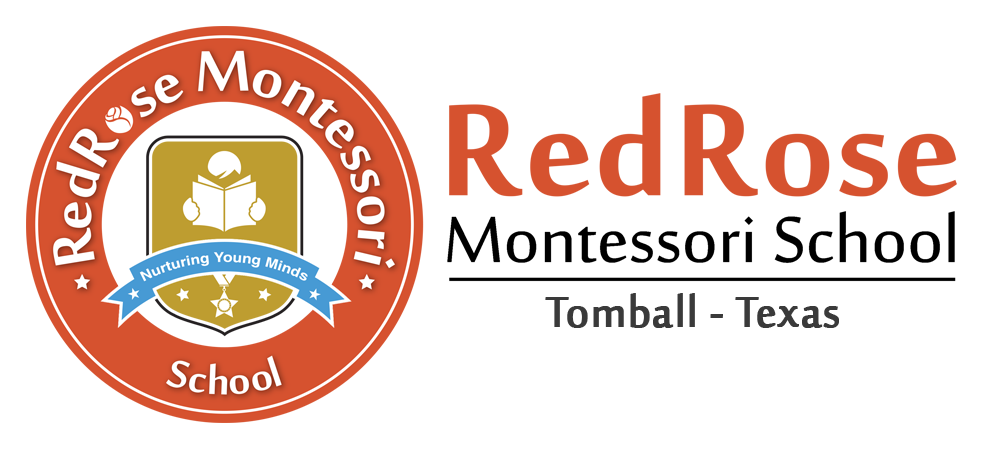Education is a natural process carried out by the human individual, and is acquired not by listening to words, but by experiences in the environment.” – Dr. Maria Montessori
Montessori School offers the finest Montessori curriculum in Cypress and Tomball, TX neighborhood. Our multi-tiered classrooms engage young children from 6 weeks to 6 years old, and foster a deep love for independent learning and social responsibility. From our caregivers at the infant level to our credentialed instructors at the primary grade level, we’ll closely monitor, care for and support your children’s needs. From gentle stimulation of their senses, to positive challenges that will reinforce their independence and unique learning activities that will engage their creativity, we support every children at each stage of their development.
RedRose Montessori School offers a wide range of curricula that includes cognitive and physical development for infants and toddlers, meaningful language and independence-building activities for preschoolers, and creative learning opportunities in core subjects for primary students. Below, you’ll see more detail on our early education programs. Feel free to contact us.
Our Curricula and Schedules
Infant curriculum (6 weeks–12 months)
We provide responsive caregiving in a clean and sanitary environment to develop secure attachment relationships with care giver to ensure that the infant feels safe, relaxed, loved, and supported within that relationship. Our loving teachers make sure to talk, sing, play and read to each child, play active games, encourage tummy time thus focusing on building muscle strength and gross motor skills, hone sensory perception in a nurturing and loving atmosphere.
Older Infant curriculum (12 weeks–18 months)
In our older infant classroom, we begin to introduce the Montessori curriculum while continuing to build on motor skills, cognitive brain development and speaking skills. Memory, language and thinking are reinforced through basic word development and we encourage them to transition from sitting and crawling to standing. The teacher slowly begins to emphasize independence, interpersonal relationships, manners and nurture curiosity about the natural world.
Toddler curriculum (18 months – 2 years)
The toddler program prepares the toddler class children for preschool work by exposing them to each area of the Montessori curriculum. The toddlers learn concentration, coordination, language skills, responsibility, and respect – all of which prepare them well for a successful transition into the Early Childhood classroom at RedRose Montessori. Our curriculum includes activities that build on fine motor skills, form the mathematical mind, assist in language development, and teach grace and courtesy for social development. Most importantly, your toddlers will be loved, nurtured and cared for by attentive, compassionate teachers.
At RRMS, we love the “No!” attitude of toddlers and twos because it’s an assertion of autonomy that leads to new developmental opportunities like increased body control and expression of feelings. Only when children feel a sense of personal power (“I can affect things”) are they ready to move to the next critical task of realizing a sense of competence (“I can achieve things”). As active learners and problem-solvers, children develop genuine confidence and a sense of who they are in the world.
Transition curriculum (2 – 3 years)
A child’s time in the Transition classroom is among one of the most important phases of your child’s development. This is where a true foundation in academic, cognitive, social and emotional skill is created. Designed with the nurturing characteristics of the toddler classroom, but with a broadened focus developmentally, this classroom provides the child with a gentle transition. During this time, the child is actively seeking out information and learning spoken language rapidly, as before he had only communicated through non-verbal cues. The children crave independence, knowledge, order, consistency and exploration of their environmental surroundings. Our Transition environment is carefully prepared for children to explore safely and achieve these developmental ideals. It is in this classroom environment that the child prepares for entrance to the Preschool/ Kindergarten Program. Children will be better able to process, make sense and order of their surroundings and develop necessary social and emotional skills before moving on to more advanced learning.
We will work on tasks such as building self-confidence, personal discipline, fine and gross motor skills, and hand-eye coordination and potty training. Order within the environment (cleaning up) as well as listening, following directions and sharing with others, sensory and practical Life tasks are learned as well as social grace and courtesy. Areas of learning are defined, yet space is open allowing for natural social interactions and development. We also focus on helping children improve their large muscle movements, hand-eye coordination and life skills (pouring, sweeping, dusting, setting a table, etc.).
Primary curriculum (3 – 6 years)
The teacher-student relationship found at RRMS creates an inviting safe and purposeful environment in which students can learn to their maximum potential. We believe in the policy that children learn more by doing. The children work on carefully designed activities while being monitored by teachers. They work on the activities in small groups or by themselves, laying a foundation for the future and in the process mastering important skills such as concentration and respecting one another. In such a natural setting of mixed age children, the younger children learn from their older classmates, while the older children reinforce their knowledge by working with younger children. The curriculum focuses on the areas of Physical and emotional and social development, Mathematics, Science, Language Development – Reading and writing, Foreign language.
In addition to the “work-time” children also enjoy social activities such as singing, storytelling, indoor and outdoor playtime.

 (713) 999-5091
(713) 999-5091 Locate us
Locate us
